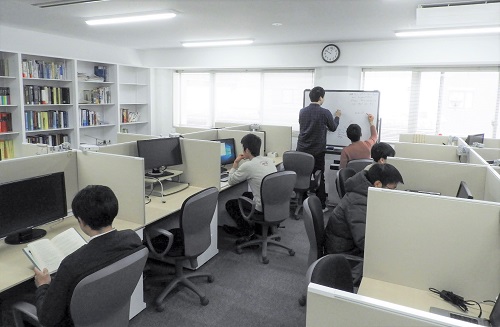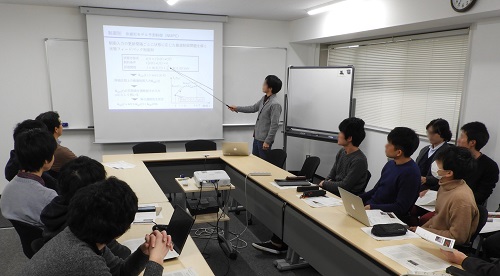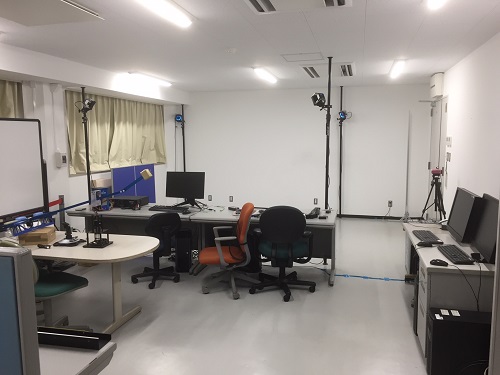How to Join
Ohtsuka Laboratory seeks students interested in thoroughly investigating modeling, analysis, design, and control of dynamical systems. Prospective students who want to develop their own original theories or tackle new practical problems are encouraged to take opportunities such as briefing sessions on entrance examinations and lab tours to learn about possible research themes in detail.
■ Undergraduate (4th Year)
Three new students are assigned every April from the Undergraduate Course Program of Mechanical and Systems Engineering, Undergraduate School of Engineering Science, Faculty of Engineering. A briefing session on lab assignments and lab tours are held in March.
■ Master's Course
About four new students are assigned every year in accordance with their choices of research groups and scores in an entrance examination. Applications from other universities are welcome. Briefing sessions on the entrance examination are held in May every year.
■ Doctoral Course
Applicants take an entrance examination for our course in August or February.
Negotiation with a potential supervisor (Prof. Ohtsuka) on research themes is required before applications.
Details on entrance examinations for Systems Science Course can be found on the web page of the Graduate School of Informatics. The Application Group of Ohtsuka Lab is SS-3.
■ Employment
Faculty members, researchers, technical assistants, and secretaries are occasionally recruited. Recruitment information can be found at Employment Opportunities of Kyoto University.
Recipients of JSPS Research Fellowships may be accepted upon request.
Policy
Ohtsuka Laboratory places great value on overall growth of all lab members through their professional experiences as well as producing essential and international research achievements. All members are expected to develop themselves through respectful relationships, mutual cooperation, and friendly competition in an environment that is calm but intellectually stimulating. In particular, students are guided toward the following goals.
- Undergraduate Students: Experience all the steps in research activities and present their bachelor's theses at conferences.
- Master's Students: Formulate and solve their own problems and publish their results at international conferences and in academic journals.
- Doctoral Students: Develop their own directions of research and publish their results at a series of international conferences and in major international journals. They are also expected to support other students and engage in international collaborations.
■ Research Themes
The research theme of each student is decided through discussions with the supervisor, Prof. Ohtsuka. Students and the supervisor shape research themes by exchanging ideas on possible directions suggested by the supervisor depending of students' interests. Research themes may be restricted to some extent depending on such circumstances as collaborative research with external organizations, large projects, and changes in faculty staff.
■ Seminars
All students and faculty members attend a weekly seminar during a semester. Two students present their research or the relevant literature each time. We actively discuss each presentation from various viewpoints. Students are expected to read relevant research articles intensively and give clear presentations on key concepts and important results. Students learn not only research trends but also writing styles of well-written research articles. Undergraduate students give their first presentations in the fall semester. Undergraduate students taking the entrance examination for the master's course do not have to attend the seminar for about one and a half months prior to the examination. Midterm presentations for master's/bachelor's theses are also held occasionally.
■ Study Groups
Graduate students attend a weekly study group on textbooks written in English. Each student is supposed to read an assigned part of the book intensively and explain its content logically and clearly. The goal of a study group is to acquire the ability to think logically as well as systematic knowledge. A different textbook has been chosen for each of the past years.
- 2024: L. T. Biegler: Nonlinear Programming: Concepts, Algorithms, and Applications to Chemical Processes, SIAM (2010)
- 2023: K. Zhou and J. C. Doyle: Essentials of Robust Control, Prentice Hall (1998)
- 2022: P. R. Kumar and P. Varaiya: Stochastic Systems: Estimation, Identification, and Adaptive Control, SIAM (2016)
- 2021: H. K. Khalil: Nonlinear Control, Pearson (2015)
Undergraduate students attend a study group on linear algebra from April to June. Although this study group reviews basic mathematics and is partly preparation for the entrance examination, it also focuses on helping students acquire the ability to think logically.
■ Practical Training
From April to June, new students experience small projects consisting of a series of modeling, simulation, control system design, and implementation using such learning tools of control engineering as LEGO Mindstorms. They present their own projects at the end. New students learn how to put their knowledge to practical use and basic skills in using such tools as Matlab/Simulink and PowerPoint.
Environment

Every student has his/her own desk, chair, laptop PC, and monitor. Students enjoy discussions while conducting their own research.

Seminars and study groups are held at the seminar room with active discussions.

In the experimental laboratory, there are pieces of experimental equipment such as drones, a 3 DOF helicopter, an inverted pendulum, magnetic levitation, and motion capture. Students can freely test their theory or algorithms on those pieces of equipment.

